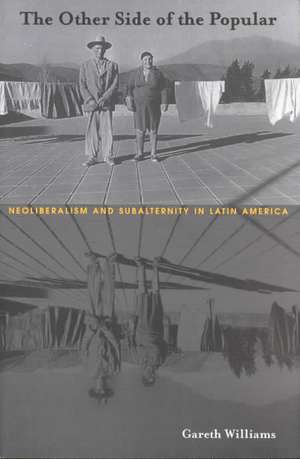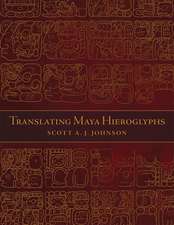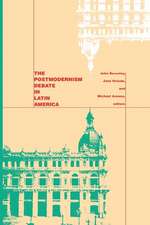The Other Side of the Popular – Neoliberalism and Subalternity in Latin America
Autor Gareth Williamsen Limba Engleză Paperback – 21 mai 2002
Preț: 306.22 lei
Nou
Puncte Express: 459
Preț estimativ în valută:
58.59€ • 61.18$ • 48.49£
58.59€ • 61.18$ • 48.49£
Carte tipărită la comandă
Livrare economică 05-19 aprilie
Preluare comenzi: 021 569.72.76
Specificații
ISBN-13: 9780822329411
ISBN-10: 0822329417
Pagini: 392
Dimensiuni: 156 x 234 x 28 mm
Greutate: 0.62 kg
Ediția:New.
Editura: MD – Duke University Press
ISBN-10: 0822329417
Pagini: 392
Dimensiuni: 156 x 234 x 28 mm
Greutate: 0.62 kg
Ediția:New.
Editura: MD – Duke University Press
Notă biografică
Gareth Williams is Assistant Professor of Spanish at Wesleyan University.
Textul de pe ultima copertă
"A serious study on the cultural challenges brought about by postmodern culture in Latin America is in order and largely overdue. In that sense, "The Other Side of the Popular" makes an invaluable contribution to the challenge of thinking about the present configuration of culture in the region. This book fills a gap in the area of Latin American cultural studies and it does so with serious scholarship, brilliance, and intellectual commitment."--Horacio Legras, Georgetown University
Cuprins
Acknowledgments
Introduction
Closure
1. The State of Things Passed: Transculturation as National-Popular Master Language
2. Intellectual Populism and the Geopolitical Structure of Knowledge
>3. Formalities of Consumption and Citizenship in the Age of Cultural Hybridity
>Intermezzo . . . Hear Say Yes
4. Hear Say Yes in Piglia: La cuidad ausente, Posthegemony, and the “Fin-negans” of Historicity
Perhaps
5. The Dispersal of the Nation and the Neoliberal Habitus: Tracing Insurrection from Central America to South Central Los Angeles
6. Of Pishtacos and Eye-Snatchers: Neoliberalism and Neoindigenism in Contemporary Peru
7. Operational Whitewash and the Negative Community
Notes
Works Cited
Index
Introduction
Closure
1. The State of Things Passed: Transculturation as National-Popular Master Language
2. Intellectual Populism and the Geopolitical Structure of Knowledge
>3. Formalities of Consumption and Citizenship in the Age of Cultural Hybridity
>Intermezzo . . . Hear Say Yes
4. Hear Say Yes in Piglia: La cuidad ausente, Posthegemony, and the “Fin-negans” of Historicity
Perhaps
5. The Dispersal of the Nation and the Neoliberal Habitus: Tracing Insurrection from Central America to South Central Los Angeles
6. Of Pishtacos and Eye-Snatchers: Neoliberalism and Neoindigenism in Contemporary Peru
7. Operational Whitewash and the Negative Community
Notes
Works Cited
Index






